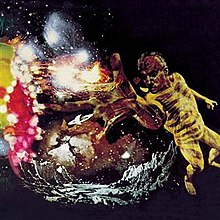
Evolution is the fifth studio album by American rock band Journey, released in March 1979 by Columbia Records. It is the band's first album to feature drummer Steve Smith.
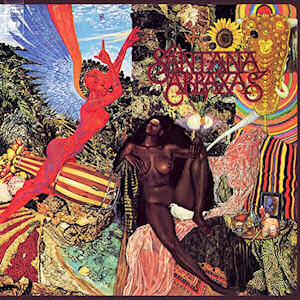
Abraxas is the second studio album by Latin rock band Santana. It was released on September 23, 1970 by Columbia Records and became the band's first album to reach number one in the United States.

Santana is the debut studio album by American Latin rock band Santana. It was released on August 22, 1969. Over half of the album's length is composed of instrumental music, recorded by what was originally a purely free-form jam band. At the suggestion of manager Bill Graham, the band took to writing more conventional songs for more impact, but managed to retain the essence of improvisation in the music.

Eagles is the debut studio album by American rock band the Eagles. The album was recorded at London's Olympic Studios with producer Glyn Johns and released on June 1, 1972. The album was an immediate success for the young band, reaching No. 22 on the charts and going platinum. Three singles were released from the album, each reaching the Top 40: "Take It Easy", "Witchy Woman", and "Peaceful Easy Feeling". The band, starting with this album, played a major role in popularizing the country rock sound.

Gregg Alan Rolie is an American keyboardist, singer and songwriter. Rolie served as lead singer of the bands Santana and Journey – both of which he co-founded. He also helmed rock group The Storm, performed in Ringo Starr & His All-Starr Band until 2021, and since 2001 with his Gregg Rolie Band. Rolie is a two-time inductee of the Rock and Roll Hall of Fame, having been inducted both as a member of Santana in 1998 and as a member of Journey in 2017.

Michael Shrieve is an American drummer, percussionist, and composer. He is best known as the drummer of the rock band Santana, playing on the band's first seven albums from 1969 to 1974. At age 20, Shrieve was the second youngest musician to perform at Woodstock. His drum solo during "Soul Sacrifice" in the Woodstock film has been described as "electrifying", although he considers his solo during the same piece in 1970 at Tanglewood the superior performance.
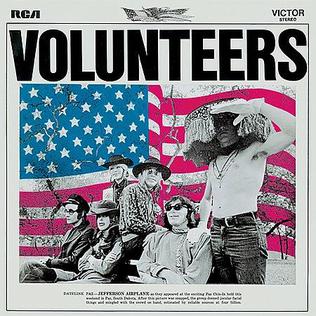
Volunteers is the fifth studio album by American psychedelic rock band Jefferson Airplane, released in 1969 on RCA Records. The album was controversial because of its revolutionary and anti-war lyrics, along with the use of profanity. The original album title was Volunteers of Amerika, but it was shortened after objections from Volunteers of America, a religious charity.

Every Good Boy Deserves Favour is the seventh album by The Moody Blues, released in 1971.

Caravanserai is the fourth studio album by American rock band Santana, released on October 11, 1972. The album marked a period of transition for Santana as it was the band's last to feature several key early members, while shifting in a more instrumental, progressive jazz fusion direction. It sold in fewer quantities than the band's previous chart-topping albums, stalling at No. 8 on the Billboard LPs chart, but has been critically acclaimed.

Welcome is the fifth studio album by Santana, released in 1973. It followed the jazz-fusion formula that the preceding Caravanserai had inaugurated, but with an expanded and different lineup this time. Gregg Rolie had left the band along with Neal Schon to form Journey, and they were replaced by Tom Coster, Richard Kermode and Leon Thomas, along with guest John McLaughlin, who had collaborated with Carlos Santana on Love Devotion Surrender. Welcome also featured John Coltrane's widow, Alice, as a pianist on the album's opening track, "Going Home" and Flora Purim on vocals. This album was far more experimental than the first four albums, and Welcome did not produce any hit singles.

Borboletta is the sixth studio album by the American Latin rock band Santana. It is one of their jazz-funk-fusion oriented albums, along with Caravanserai (1972), and Welcome (1973). Non-band albums by Carlos Santana in this style also include Love Devotion Surrender (1973) with John McLaughlin and Illuminations (1974) with Alice Coltrane, Jack DeJohnette and Jules Broussard. The guitarist leaves much room to percussion, saxophone and keyboards to set moods, as well as lengthy solos by himself and vocals. The record was released in a metallic blue sleeve displaying a butterfly, an allusion to the album Butterfly Dreams (1973) by Brazilian musician Flora Purim and her husband Airto Moreira, whose contributions deeply influenced the sound of Borboletta. In Portuguese, borboleta means "butterfly".

Amigos is the seventh studio album by Santana released in 1976. It generated a minor U.S. hit single in "Let It Shine" and was the band's first album to hit the top ten on the Billboard charts since Caravanserai in 1972. In Europe, the song "Europa" was released as a single and became a top ten hit in several countries.
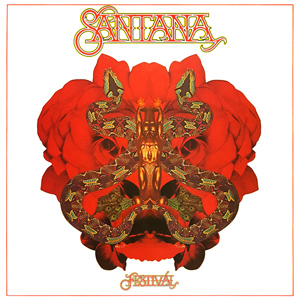
Festivál is the eighth studio album by Santana, released in January 1977. It peaked number twenty seven in the Billboard 200 chart and number twenty nine in the R&B Albums chart.
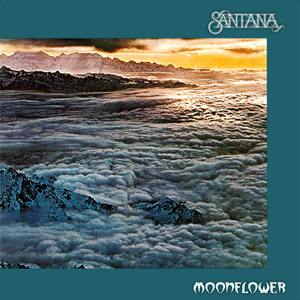
Moonflower is a double album released in 1977 by Santana. The recording features both studio and live tracks, which are interspersed with one another throughout the album. It is perhaps the group's most popular live album, because the 1974 album Lotus did not receive a U.S. domestic release until 1991. It displays a mix between the fusion of Latin and blues rock styles of the late 1960s and early 1970s, and the much more experimental and spiritual jazz fusion sound that characterized the band's mid-1970s work. The live material was recorded during the supporting tour for the Amigos album. This is the first of 5 albums with drummer Graham Lear.

Zebop! is the 12th studio album by the American rock band Santana. The album had several releases, and various different color cover backgrounds, including pink and red. The album featured "Winning"; both the album and single were one of Santana's last top 40 hits until 1999 with their release of Supernatural.

Beyond Appearances is the fourteenth studio album by Santana, released in 1985.
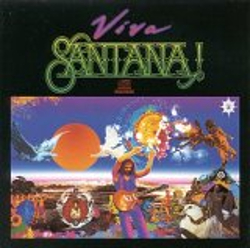
Viva Santana! is a 1988 compilation album by Santana.

Sacred Fire: Live in South America is an album by Santana, released in 1993. This album is dedicated to the life of Cesar Chavez. The title, "Live in South America", is not correct, as the location of the concert production, Mexico City, is not located on the continent of South America.

Santana is an American rock band formed in San Francisco in 1966 by Mexican-born guitarist Carlos Santana. The band has undergone various recording and performing line-ups in its history, with Santana being the only consistent member. After signing with Columbia Records, the band's appearance at the Woodstock Festival in 1969 increased their profile, and they went on to record the commercially successful and critically-acclaimed albums Santana (1969), Abraxas (1970), and Santana III (1971). These were recorded by the group's "classic" line-up, featuring Gregg Rolie, Michael Carabello, Michael Shrieve, David Brown, and José "Chepito" Areas. Hit songs of this period include "Evil Ways", "Black Magic Woman", "Oye Como Va", and the instrumental "Samba Pa Ti".

Santana IV is the twenty-fourth studio album by American rock band Santana, released in April 2016.
